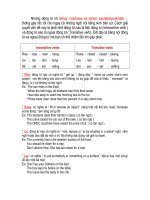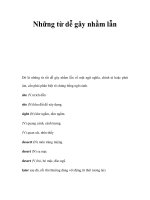Động từ dễ gây nhầm lãn 1 ppsx
Bạn đang xem bản rút gọn của tài liệu. Xem và tải ngay bản đầy đủ của tài liệu tại đây (62.13 KB, 11 trang )
criteria/criterion
CRITERIA/CRITERION
There are several words with Latin or Greek roots whose plural forms ending in A are constantly
mistaken for singular ones. See, for instance, data and media. You can have one criterion or many
criteria. Don’t confuse them.
List of errors
file:///C|/Temp/livres/commonerrors/errors/criteria.html03/09/2005 15:37:25
criticism
CRITICISM
Beginning literature or art history students are often surprised to learn that in such contexts
“criticism” can be a neutral term meaning simply “evaluating a work of literature or art.” A critical
article about The Color Purple can be entirely positive about Alice Walker’s novel. Movie critics
write about films they like as well as about films they dislike: writing of both kinds is called
“criticism.”
List of errors
file:///C|/Temp/livres/commonerrors/errors/criticism.html03/09/2005 15:37:25
critique
CRITIQUE/CRITICIZE
A critique is a detailed evaluation of something. The formal way to request one is “give me your
critique,” though people often say informally “critique this"—meaning “evaluate it thoroughly.” But
"critique” as a verb is not synonymous with “criticize” and should not be routinely substituted for it.
“Josh critiqued my backhand” means Josh evaluated your tennis technique but not necessarily that he
found it lacking. “Josh criticized my backhand” means that he had a low opinion of it.
You can write criticism on a subject, but you don’t criticize on something, you just criticize it.
List of errors
file:///C|/Temp/livres/commonerrors/errors/critique.html03/09/2005 15:37:25
crucifiction
CRUCIFICTION
CRUCIFIXION
One might suppose that this common misspelling was a product of skepticism were it not for the fact that it most often occurs in the writings of
believers. The word should make clear that Jesus was affixed to the cross, not imply that his killing is regarded as a fiction.
List of errors
file:///C|/Temp/livres/commonerrors/errors/crucifiction.html03/09/2005 15:37:26
currant/current
CURRANT/CURRENT
“Current” is an adjective having to do with the present time, and can also be a noun naming a thing
that, like time, flows: electrical current, currents of public opinion. “Currant”refers only to little
fruits.
List of errors
file:///C|/Temp/livres/commonerrors/errors/currant.html03/09/2005 15:37:26
cut and dry
CUT AND DRY
CUT AND DRIED
Many people mishear the standard expression meaning “set,” “not open to change,” as “cut and dry.” Although this form is listed in the Oxford English
Dictionary, it is definitely less common in sophisticated writing. The dominant modern usage is “cut and dried.” When used to modify a noun, it must be
hyphenated: “cut-and-dried plan.”
List of errors
file:///C|/Temp/livres/commonerrors/errors/cutanddry.html03/09/2005 15:37:26
cut and paste
CUT AND PASTE/COPY AND PASTE
Because “cut and paste” is a familiar phrase, many people say it when they mean “copy and paste” in
a computer context. This can lead to disastrous results if followed literally by an inexpert person. If
you mean to tell someone to duplicate something rather than move it, say "copy.” And when you are
moving bits of computer information from one place to another the safest sequence is often to copy
the original, paste the copy elsewhere, and only then delete (cut) the original.
List of errors
file:///C|/Temp/livres/commonerrors/errors/cut.html03/09/2005 15:37:27
damped/dampened
DAMPED/DAMPENED
When the vibration of a wheel is reduced it is damped, but when you drive through a puddle your tire
is dampened. “Dampened” always has to do with wetting, if only metaphorically: “The
announcement that Bob’s parents were staying home after all dampened the spirits of the party-
goers.” The parents are being a wet blanket.
List of errors
file:///C|/Temp/livres/commonerrors/errors/damped.html03/09/2005 15:37:27
dangling and misplaced modifiers
DANGLING AND MISPLACED
MODIFIERS
Dangling and misplaced modifiers are discussed at length in usage guides partly because they are
very common and partly because there are many different kinds of them. But it is not necessary to
understand the grammatical details involved to grasp the basic principle: words or phrases which
modify some other word or phrase in a sentence should be clearly, firmly joined to them and not
dangle off forlornly on their own.
Sometimes the dangling phrase is simply too far removed from the word it modifies, as in “Sputtering
on the grill, Theo smelled the Copper River salmon.” This makes it sound like Theo is being
barbecued, because his name is the nearest noun to “sizzling on the grill.” We need to move the
dangling modifier closer to the word it really modifies: “salmon.” “Theo smelled the Copper River
salmon sizzling on the grill.”
Sometimes it’s not clear which of two possible words a modifier modifies: “Felicia is allergic to raw
apples and almonds.” Is she allergic only to raw almonds, or all almonds—even roasted ones? This
could be matter of life and death. Here’s a much clearer version: “Felicia is allergic to almonds and
raw apples.” “Raw” now clearly modifies only “apples.”
Dangling modifiers involving verbs are especially common and sometimes difficult to spot. For
instance, consider this sentence: “Having bought the harpsichord, it now needed tuning.” There is no
one mentioned in the sentence who did the buying. One way to fix this is to insert the name of
someone and make the two halves of the sentence parallel in form: “Wei Chi, having bought the
harpsichord, now needed to tune it.” If you have a person in mind, it is easy to forget the reader needs
to be told about that person; but he or she can't be just “understood.”
Here’s another sentence with a dangling modifier, in this case at the end of a sentence: “The
retirement party was a disaster, not having realized that Arthur had been jailed the previous week.”
There is nobody here doing the realizing. One fix: “The retirement party was a disaster because we
had not realized that Arthur had been jailed the previous week.”
Using passive verbs will often trip you up: “In reviewing Gareth’s computer records, hundreds of
hours spent playing online games were identified.” This sort of thing looks fine to a lot of people and
in fact is common in professional writing, but technically somebody specific needs to be mentioned
in the sentence as doing the identifying. Inserting a doer and shifting to the active voice will fix the
problem. While we’re at it, let’s make clear that Arthur was doing the playing: “The auditor, in
checking his computer records, identified hundreds of hours that Gareth had spent playing online
games.”
Adverbs like “almost,” “even,” “hardly,” “just,” “only,” and “nearly,” are especially likely to get
file:///C|/Temp/livres/commonerrors/errors/dangling.html (1 sur 2)03/09/2005 15:37:27
dangling and misplaced modifiers
stuck in the wrong spot in a sentence. “Romeo almost kissed Juliet as soon as he met her” means he
didn’t kiss her—he only held her hand. True, but you might want to say something quite different:
“Romeo kissed Juliet almost as soon as he met her.” The placement of the modifier is crucial.
See also
only.
List of errors
file:///C|/Temp/livres/commonerrors/errors/dangling.html (2 sur 2)03/09/2005 15:37:27
daring-do
DARING-DO
DERRING-DO
The expression logically should be “feats of daring-do” because that’s just what it means: deeds of extreme daring. But through a chain of
misunderstandings explained in the Oxford English Dictionary, the standard form evolved with the unusual spelling “derring-do,” and “daring-do” is an
error.
List of errors
file:///C|/Temp/livres/commonerrors/errors/daringdo.html03/09/2005 15:37:27









